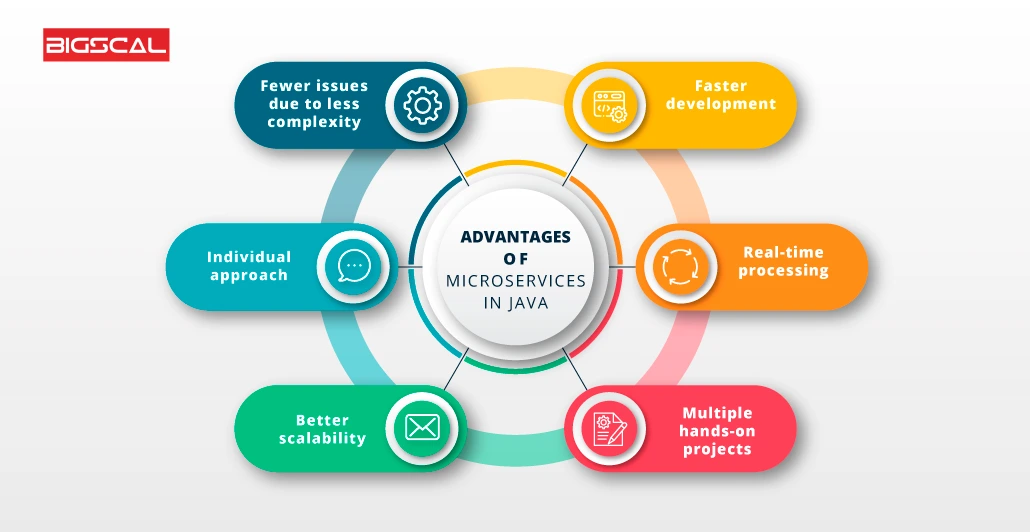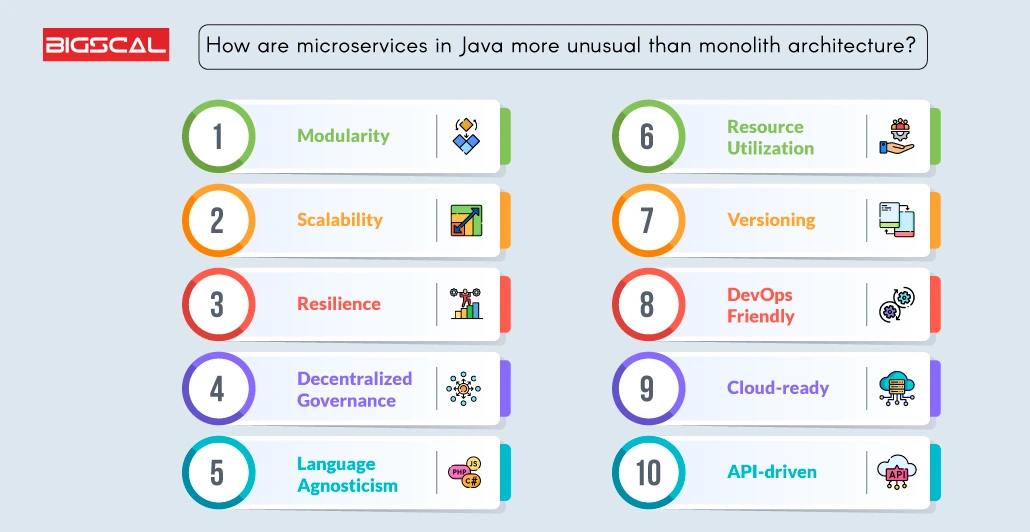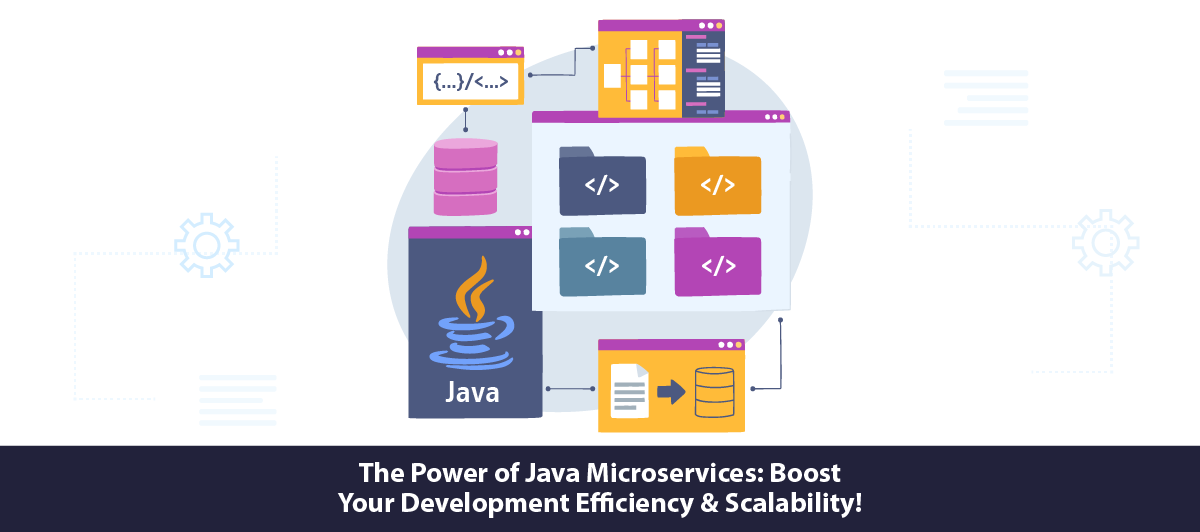Everything You Need To Know About Java Microservices Architecture In 2024
Quick Summary: Java, you guys must be aware about. But a more interesting topic is java microservices architecture. So, that is what we will discuss in this article. It will help you to learn how you can break down your application into smaller parts. And also, how you can deploy all these independently. So, read it on and discover its key concepts, advantages, and specialities.
Introduction
Along with customer-facing technologies, back-end ones are also gaining enormous popularity. The game needs to level up with shifting user demands and advancement in the mobile landscape. Developers need to enhance the technology to keep these systems in trend. The term Microservices has gained a lot of hype lately. You can notice a clear spike in the usage of this term within the past few years. And surprisingly, this fame game isn’t slowing down yet. And it’s extremely clear from the present circumstances that Java microservices architecture will go a long way.
As Microservices is not just a fancy word now, it should be adopted by the web development company. It is a proven technology that has gained popularity for developing scalable, dependable and safe applications for future problems. Some tech giants that have shifted to this technology are Uber and Netflix. They have switched this to meet their business goals. Although it’s a thorny part to switch with the right frameworks for microservices, it becomes easier. Java is one of those frameworks that can be apt for implementing Microservices. Want to know more about Java Microservices? Keep reading.
Introduction to Microservices
Microservices are an architectural way that leads to the software development process through small components and modules. These components and models possess certain business goals. And each module has a server API that helps communicate with other system modules. Microservices in Java were introduced when the software development industry became service oriented rather than a traditional approach. When a developer makes a Java application with independent and small modules, it performs better than ever.
Best Java Development Services uses Microservices framework in correlates to the traditionally used Microservices architecture. It is compatible with all languages as the barriers do not restrict usage. Hence one can enjoy flexibility and freedom to develop some unusual applications. Also, with Java Microservices, a developer can deploy an application without any issue with its functionality. You might not know that the architecture of Java Microservices is not more unusual than traditional Microservices architecture. Now that you are aware of What are Microservices in Java?, it’s time to look at its benefits.
Why Is It Advantageous To Use Microservices In Java?

Java Microservices help you benefit from the huge ecosystem of Java-based frameworks that collectively work for better solutions. Want to know more benefits of Java Microservices? Here’s a list:
1. Fewer issues due to less complexity:
It’s evident that dividing your application into smaller units or components will reduce the complexity during implementation. Each development team working on the project on different aspects can work independently. They will have to just work on their part of coding independently of the entire project. They can serve better as they need not worry about impacting the entire product. Microservices will help simplify those complex segments of each project. Hence, developing less complex services rather than an entire application becomes effortless.
2. Individual approach:
It calls for an alarming situation when you have more than one person working on a single project. But Java Microservices can help you battle these worries. No matter how many experts work on one project, they need not worry about their status impacting the entire application. Java Microservices follow an isolated success approach. With this approach, each segment is divided into smaller components. Each of them is responsible for the Differences of Java and JavaScript. It will ensure the safety and better success of the application.
3. Better scalability:
It doesn’t matter how efficient you are or how well you execute your development process; there might be a bug. But that doesn’t challenge your ability as a developer. It’s natural to observe bugs under every circumstance. But finding those bugs inside such a huge assignment can be a horrible task while you plan to scale your application. But thanks to Java Microservices, you can easily find out the problem through the service in which you are facing issues. Just check which service is not functional or is facing errors. Also, it is possible to remove a part per the company’s demand while scaling the application.
4. Faster development:
While you compare a complete Java application development and the Java Microservices approach, the second one makes the process faster. You can deploy and implement the Java Microservices product in a lesser time. It is all due to the elimination of time you spend finding and fixing errors. With traditional methods, this is a troubling process. As each service made by a Java development company is developed and tested in real time, there’s no chance of errors. The time that you save while developing can be useful in marketing it.
5. Real-time processing:
Continuous testing and deploying is a major part of developing an application with Java Microservices. It will help you process your product in real-time. Later when they find any bug, the team will immediately work on that particular service. They won’t perform revisions. The entire application. These instant revisions or renewals will help developers continue real-time processing.
6. Multiple hands-on projects:
Microservices in Java ensure that many teams collaborate on a single project. These teams have different ideas and mindsets for implementing services with the Microservices framework. Hence, it allows developers to brainstorm all the ideas and take the best approach. It will contribute to the productivity of each time and teach them how to maintain professional collaboration.
Characteristics Of Microservices In Java
Here is a list of the main characteristics of Microservices in Java:
Multiple components:
A project made with Java Microservices architecture can be divided into various components. And several components in it are updated, tested and deployed differently. Each developer can perform tasks on specific parts without affecting the entire application.
Easy Routing:
Microservices transmit their data using wires to different components. These wires help those components get requests, process them and provide the necessary output to the consecutive components. Microservices in Java are responsible for providing the best routing with the help of receiving requests and using logic to provide the best response.
Decentralized:
Web application development with Java Microservices services framework provides decentralized data management. It helps developers create certain tools for specific components, which other components can also employ. Also, decentralizing code will help them use codes of other contents to bootstrap the project. They need not write the entire application from the first part.
Fail-proof:
Thankfully the Microservices applications are dependable as they divert traffic to other components in case of failure. Hire Java developers, they can easily identify bugs and fix them immediately to avoid clashes with microservices.
How Are Microservices In Java More Unusual Than Monolith Architecture?

The decentralized nature of Java Microservices is ample enough to state why they should be used in web application development. However, let’s go through some more reasons to choose them while your web application development services:
Modularity:
The components in Java Microservices are distributed as small and independent components. Each of them can be put under test, deployment and development independently. Hence modular nature makes it a preferable choice.
Scalability:
Scaling is a crucial aspect to consider while undertaking back-end development. With Java Microservices architecture, you can scale your application easily and satisfy changing demands.
Resilience:
One of the benefits of Java Microservices is their resilient nature. They can tolerate fault and even self-heal in case of problems with any part. It means that they will function continuously if any of the services in the system face failure.
Decentralized Governance:
Java Microservices have a decentralized nature that facilitates autonomous deployment. It also provides continuous scaling and management.
Language Agnosticism:
With these Microservices, a developer gets an edge over languages. No matter what development language they are familiar with, they can use Java Microservices. Its components can converse with other components in any programming language they prefer.
Resource Utilization:
One advantage that is noticeable to the majority of developers is the utilization of fewer resources than monolithic. Hence with this, you can get efficient results without spending much.
Versioning:
Java Microservices is known to support multiple versions of the same services simultaneously. Hence a developer can expect backward compatibility along with efficient rollbacks from it.
DevOps Friendly:
Microservices architecture is developed to integrate easily with DevOps and other workflows. It will facilitate automatic checking and ceaseless deployment.
Cloud-ready:
If you want to build an application, just hire a Java programmer comfortable with Microservices architecture. It facilitates deploying with varied cloud environments like public, hybrid and private clouds.
API-driven:
Microservices communicate with each other with different API-based facilities. It will help them easily integrate with external services.
Read more: 7 Reasons Developers Choose Java For Web Development
Why Prefer Java For Microservices?
When implementing Microservices, you can gain help from certain tools and languages. But Java still stands as a strong competitor among Microservices implementation. Here are reasons to use Java Microservices:
1. Multiple frameworks:
Java facilities are working with several frameworks that are comfortable with Microservices development. The frameworks within Java make it easy and faster to work with Microservices. Some of these services that Java Developers use are Jersey, Spark, Boot, etc. These frameworks are responsible for simplification of the setup and configuration steps. These steps assist developers in establishing communication between Microservices. Many publish and subscribe features available in Java are crucial for developing Microservices.
2. Better community support:
Java is experiencing huge popularity among developers these days. It has let the programming language gain a huge community along with many frameworks and libraries. Java allows you to develop complex websites and applications as it is dependent on JVM. You can hire a Java programmer to develop enterprise-grade applications, back-end development, big data and even cloud-based applications. You can also expect to develop AI or scientific applications with Java easily. The fascinating fact is that you can easily access Java developers with exceptional skill sets. Some developers understand what Microservices are in Java and their importance.
3. Standard and syntax:
Java is based on simpler annotations that are less harsh on developers and easier to analyze. Standards of Java EE are known to support the architecture of Microservices such as JPA for handling data, CDIs for complement and lifestyle management, APIs to be handled by JAX-Rs and many more. Java is becoming a friendly option when you consider developing and implementing complicated systems. The Java development process is made into a way to allow Microservices creation and implementation without the necessity of overhead.
4. From monolith to microservices:
The market across the globe is constantly evolving. Hence, meeting the needs of people or changing trends is a huge problem. Some organizations, whether small or large, want to implement the latest trends to meet daily life challenges effectively. But when adapting to new technologies, you must rewrite the entire application. It is not a considerable choice as it involves huge waste capital. Also, the cost of deployment for larger applications is too much. It is where Microservices architecture can have benefits over monolith ones. Just update a small part of the services without altering the entire application.
What Is The Working Of Java Microservices?
Before getting into more details about Java Microservices, generalizing is crucial. Microservices Architecture, in general, is a process for software development with a segregated approach. It means that the application is developed into loosely coupled and independent services. These services further interact with APIs for working in combination.
This component-based approach makes the development process faster and effortless. Many teams can work together on that application while deploying their services without depending on others. Now that you know what Microservices are, it’s better to move forward with Java Microservices.
As a developer, you often have encountered questions like which is the most beneficial Java framework for Microservices implementation? So here’s an answer to this query. Below is a list of the top Java frameworks:
1. Spring Boot
Spring Boot is the most popular open-source framework based on Java. With this, you can work on a small Microservices project that keeps interacting quickly. Corporations hire spring developers as the demand for open-source frameworks increases. These developers help with building enterprise-level applications within spring boot. This platform facilitates the development of secure and effective working Interfaces supporting consumer and source systems. Also, it facilitates building features based on purposes to develop and scale your project.
2. Jersey
This Java framework is responsible for communication among Microservices. It also simplifies the development process of REST web services. Also, it can be helpful as a reference for implementing JAX-RS.
3. Swagger
Swagger is a Java-based framework that is responsible for developing APIs. Also, it is a package of tools that help in Standard documentation for AP. Like Jersey, this framework can function as a communication layer among Microservices.
Java Microservices Application: Cases of Usage
There are plenty of applications that a developer can develop or even can scale the already existing applications with Microservices architecture. Below are some of the best cases of usage of Java Microservices. These cases will help you either scale your existing applications or build a new one that is effective and better working.
Modernization and Refactoring of the Legacy Applications
Adopting Java Microservices while developing an application that demands constant updation as per market demand is a great idea. It will help you adapt to recent trends without impacting the entire application. Hence, this approach allows you to add some extra features and functions without mending the existing ones. You can add recent features without hampering rest functionalities.
Applications that Need Extensive Data Management
Microservices can be a good choice for developing complicated apps and cloud environments when you join it with the approach based on events. It divided the data into separate compartments where each has its functionalities.
Real-time Data Processing Applications
If you have a client needing an application that helps with real-time data processing, Java Microservices is advisable. You, as a developer, can incorporate as many microservices as you want and divide the data processing tasks into different segments. It can further enhance the application’s working efficiency. The components-based services will let data only come from the required segment, not the entire data.
Multi-Group Application Development
With market trends changing each day, there is a demand for constant changes within the application. Also, to bind to the project’s deadlines, multiple developers must work on the project. Hence using microservices architecture for the development process could prevent issues that arise in the coming years. The individual components in this approach can be separated and combined by different groups working on it.
Conclusion
Until now, you might have learned that Microservices provide flexibility to the developers to work on complex development projects. This technology helps them develop applications that are easily scalable and resilient. Java and its frameworks are one of the best solutions when you want to implement Microservices. If you are looking to build an application with Microservices architecture, it’s great to use Java, as there is a huge community of Java developers. The details mentioned in the content can help you achieve your goals. The other part of building your web application with Java Microservices is choosing the best among developers. Embrace the benefits of Java Microservices by hiring best-in-class Java developers.
FAQ
Why is Java a top choice for Microservices?
Compared to other languages, the annotations of Java are easier to read and understand. Hence Java frameworks make it easy to develop Microservices applications through coding.
What are the best features of Microservices in Java?
Some main features of Microservices are:
- The complexity of code is hidden
- Data management is taken through a centralized approach.
- Microservices facilitate the Polyglot approach.
- You can adjust architecture as per your business needs.
- The entire application is divided into small portions for easy management.
- DevOps works with Microservices architecture.
How is communication within components established in Java microservices?
Microservices in Java undertake communication processes through IP protocols such as HTTP. These protocols are asynchronous and synchronous.
How much time is required to learn microservices in Java?
If you are familiar with Java basics, then it’s an easy call. All you can do to learn Java Microservices is to get a mentor. An expert will help you understand all the aspects better.
How to test Microservices in Java?
The testing process is an easier one in Java Microservices. You just have to divide a particular component and conduct testing. You can try using DI testing or perform it through JUnit.







